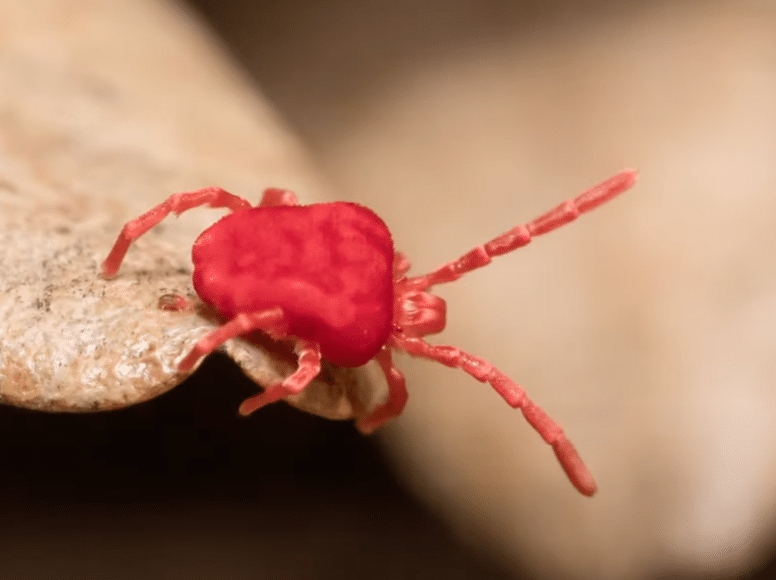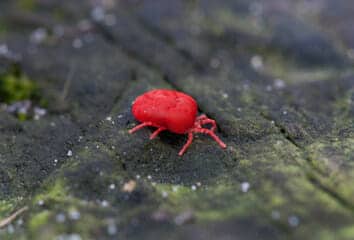Chiggers are unsavory skin-eating pests that can ruin any outdoor activity. Apart from their itchy bites and unsavory appearances, these arachnids are also known to transmit disease.
Thankfully, chiggers aren’t impossible pests to remove from your lawn or garden. You can get rid of chiggers and their larvae with a few prevention steps, some DIY treatments, and a pinch of elbow grease.
Here’s everything you need to know about fixing a chigger problem, including what these arachnids look like, how to treat their bites, and what products you can use to eliminate them for good.
What Are Chiggers?
Chiggers are arachnids from the Trombiculidae family, which includes approximately 10,000 different species of mites. These pests remain active throughout spring and early summer and only go dormant after the first frosts of fall.
There are many different names for chiggers in the US, including harvest mites, red bugs, berry bugs, and harvest lice. However, all of these names refer to the same thing: a bright-red mite with parasitic larvae.
You can identify adult chiggers by:
- Its eight legs. Unlike other outdoor insects, chiggers have more than six legs.
- Its bright red body. Adults are seen easily by the naked eye.
- It’s bite. These are typically much smaller and itchier than your average mosquito bite.
You should know that adult chigger mites cannot bite or effect humans in any way. Instead, their almost microscopic larvae latch onto human skin and use specialized saliva to dissolve skin cells. Then, the chigger ingests the liquified skin cells with a tiny feeding tube before dropping off the host.
Chigger bites aren’t always dangerous, but they do have the potential to spread disease. One of the most serious of these includes scrub typhus, a bacterial infection that can cause headaches, fevers, and rashes. Although this is extremely rare, scrub typhus may prove fatal when left untreated — yet another reason to quickly remove chiggers from your yard.
Symptoms and Causes of Chigger Bites
Some people believe chiggers burrow under the skin to feed on human blood. However, that isn’t exactly true. These insects do latch onto the skin to feed, but they cannot burrow like jigger fleas or scabies mites. Either way, they’re capable of leaving itchy bites behind that take days if not weeks to heal completely.
You can identify a chigger bite on your skin by:
- The color. Chigger bites look like tiny red bumps and are sometimes filled with liquid.
- The location. Chiggers attach themselves to thin skin near the ankles, waist, or armpits.
- The duration. Unlike mosquito bites, the itchiness of chigger bites can last for several days.
Chigger larvae typically detach from your skin long before you feel the effects of their bite. That said, you should treat your skin as if the pest were still latched on so you can minimize their spread to the rest of your body.
Here are some tips to treat chigger bites:
- First, wash the area with soap and water to remove chiggers still latched on the skin.
- Apply calamine lotion or other anti itch creams to the affected area. Don’t use nail polish to ‘suffocate’ harvest mites. Remember, they don’t burrow into skin.
- Alternate between a cold compress and hot water to overwhelm your nerve endings and reduce itching.
- Avoid scratching affected areas as much as possible. Too much scratching could lead to bleeding, scarring, or secondary infections from bacteria.
If you discover a significant number of chigger bites on your skin, you may want to seek professional treatment.
When to seek medical attention for chigger bites
You should seek medical attention for chigger bites if you develop swelling, fever, or anaphylactic shock. Your local walk-in clinic should be able to prescribe prescription medications to address allergic reactions (and relieve some of your intense itching).
A few of these prescription medications may include steroid creams, antibiotics, or specialized antihistamines.
Preventative Measures for Chiggers
The best way to prevent chigger bites from affecting the ones you love is to stop harvest mites from infesting your yard in the first place. That means following all best practices to reduce attractant factors around your yard.
You can prevent chiggers by:
- Eliminating any chigger hot spots around the sides of your home. You may want to pick up leaf litter around shady areas or cut down tall grasses and dense vegetation.
- Keeping the lawn mowed every week. You can use our comprehensive lawn care guide to determine the best height for your grass species.
- Wear long pants, tall socks, and other protective clothing to keep chiggers away from your skin. Consider using bug spray like Ben’s 100 Deet to stop bites long before happen.
Have chiggers already made their way into your yard or garden? These preventative measures may not be enough to protect your property. Instead, you need to select a more immediate treatment from the list below.

Getting Rid of Chiggers with Home Remedies
Chiggers can be difficult to control without multiple treatment modalities. However, that doesn’t mean you can’t take a natural approach when DIYing your yard.
Here’s how to get rid of chiggers using home remedies.
Natural remedies to get rid of chiggers
So you’re interested in using natural remedies to kill chiggers in your yard. You should start by addressing all the places where chiggers live:
- Chiggers live in grassy areas with lots of thick vegetation. Try mowing, pruning, or cutting back tall grassy areas, then remove dense foliage near the sides of your home.
- Try sprinkling diatomaceous earth (DE) around hotspot areas in your yard. This includes tall grass, entry points, and any outdoor animal shelters (like chicken coops and dog houses).
- Use sulfur applications to disrupt the chigger’s metabolism and send them away from your home. Apply at least one pound per every 500 square feet of grass.
Remember: don’t leave any exposed skin for chiggers to find while out in the yard!
Using essential oils to repel chiggers
Chiggers, like mosquitoes and bed bugs, are sensitive to essential oils. Spraying a diluted mixture on yourself and your clothing may prevent chigger bites from attacking exposed skin.
Some essential oils that are proven to repel chiggers include:
- Citronella
- Tea tree
- Jojoba
- Eucalyptus
- Geranium
- Lemon grass
DIY chigger repellent sprays
Perhaps the most widely used technique for preventing chigger bites is covering up exposed skin and spraying repellents on shoes and socks. Be sure to your wash clothing after coming back inside to prevent chigger larvae from migrating around the house.
Over-The-Counter Products
Want instant relief from your chigger infestation? Inorganic compounds may be your best bet.
Here’s how to get rid of chiggers in your yard with more traditional over the counter products.
Liquid products for chiggers
Some of the most effective treatments for chigger infestations involve liquid applications:
- ExciteR Pyrethrin Insecticide
- Viper Insecticide Concentrate
- Onslaught Time Release Microencapsulated Insecticide
Apply these to your grass according to the label for best results.
Dust products for chiggers
Don’t want to apply pure liquid products to your property? You can always opt for powder-based solutions.
These include:
As always, only apply the amount posted on the label to your affected area.
Insect repellent sprays for chigger prevention
As mentioned previously, you can use Ben’s Repellent to keep biting pests away from your skin. You should always couple this with protective clothing, and wear long sleeves while near hotspot areas. Be sure to put on other articles of chigger repellent clothing (like tall socks) to prevent larvae from latching onto your pant legs.
Seeking help from a pest control professional
You may not be able to manage a chigger infestation on your own. If you can no longer leave your home without the threat of bites, you may need to turn to professional experts with access to more advanced treatments. Look for a local professional in your area that offers targeted outdoor services, as well as eco-friendly or natural treatments if you let pets into tall grass frequently.
Final Thoughts: How to Get Rid of Chiggers
The importance of getting rid of chiggers fast cannot be underestimated. Thankfully, there are lots of options available to repel them from your yard. From natural treatments and insect repellent to specialized liquids and dusts, you can use a combination of expert treatments to keep these tiny pests at bay.
Do you have any tips for removing chiggers from the yard or garden? Or do want to share treatment experiences of your own? Let us know down below!
FAQs
What kills chiggers instantly?
Chiggers are instantly killed by on-contact sprays like ExciteR Pyrethrin Insecticide. You can also use insecticidal dusts like Anderson Duocide Insect Control on DG Pro to kill chiggers fast. Just make sure to apply all products according to their label.
How long does it take for chiggers to go away?
Chiggers only live about 50 to 70 days on average, meaning most die naturally after about two months. Treating chiggers at home, of course, will speed up this timeline dramatically. Natural treatments can take effect within a few weeks. Other insecticides, like ExciteR Pyrethrin Insecticide, kill chiggers immediately upon contact.
What kills chiggers on skin?
As soon as you notice chigger bites on your skin, jump into the shower and scrub off with soap and hot water. Wash your clothing on the highest heat setting to kill any mites left on your clothing. Then, use antihistamines and calamine lotion to relieve itching until the skin heals.
Will rubbing alcohol kill chiggers?
Rubbing alcohol does kill chiggers — but it’s an ineffective method at best. Since chiggers don’t burrow into human skin, you don’t have the opportunity to treat them individually. Plus, the itchy sensations of chigger bites occur long after pests have dropped off your skin. Your best bet is to shower with hot water and treat chigger bites with anti itch creams or products like After Bite.

